
39 minute read
Making My Point
California Sports Betting: A Game of Inches
In the wake of a failed attempt to legalize sports betting, work quietly continues on a proposal that favors the state’s 62 gaming tribes
Advertisement
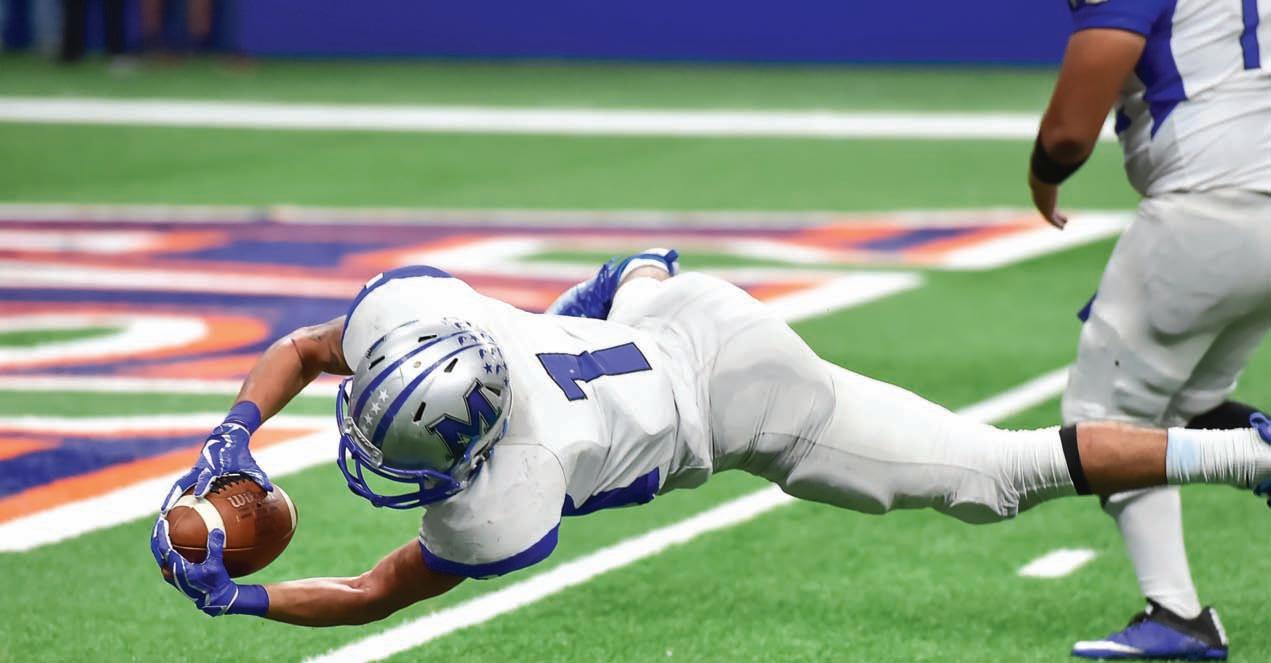
By Marjorie Preston
When it comes to gaming in California, not much happens without the consent of the state’s powerful gaming tribes— and that includes sports betting.
Last year, state Senator Bill Dodd and Assemblyman Adam Gray pushed identical sports betting bills they said would capture millions of dollars “currently bolstering the profits of illegal, out-of-state sports wagering operators.”
But the tribes balked, because the measure cut in the state’s commercial card rooms. The two sides have long warred over banked card games and other forms of betting that the tribes feel are exclusively theirs.
And opposition from gaming tribes—who generate a total economic impact approaching $20 billion a year, and contribute billions in taxes—was enough to push the issue onto the back burner.
Without sports betting, everyone is leaving money on the table. But the tribes won’t be rushed into a deal—and they won’t say much about efforts behind the scenes, either.
“Tribes are being tight-lipped” about the subject, said a source who spoke to GGB on condition of anonymity. “But they have a lot of incentive to get it done, and done right the first time. They hold the key to the kingdom.”
The demise of the Dodd-Gray legislation acknowledged “the power the tribes have gained over the last 20 years,” Reno-based consultant Ken Adams told the Sacramento Beelast year. “Anybody who wants to get a bill through the legislature is going to have to face that.”
High Stakes
Since 2018, when the U.S. Supreme Court repealed the Professional and Amateur Sports Protection Act (PASPA), the legal sports betting industry has grown from a single state to 25, with 21 markets up and running and legislation pending in more than a dozen more. D.C. is also in the game.
That rapid-fire growth is driven in part by Covid-19, which has caused even holdout states (Hawaii, Texas, Florida) to reconsider sports betting as a budget stopgap.
With a $54 billion budget deficit—the worst in its history—California is equally motivated. And though sports betting is a low-margin industry, the Golden State, with a nation-leading population of almost 40 million, could be the biggest untapped market of all.
The left coast has 16 teams in North America’s Big 4 leagues: Major League Baseball (the L.A. Dodgers, Oakland A’s, San Diego Padres, San Francisco Giants and L.A. Angels); the NFL (L.A. Rams, L.A. Chargers and San Francisco 49ers); the NBA (the L.A Lakers, L.A. Clippers, Golden State Warriors and Sacramento Kings); the NHL (Anaheim Ducks, L.A. Kings, San Jose Sharks); and Major League Soccer (L.A. Galaxy, L.A. FC and San Jose Earthquakes).
The Dodd-Gray plan would also allow wagers on professional and college sports; the tribal version would ban betting on college games played by teams from California. According to estimates from Eilers & Krejcik Gaming, sports betting in this sports-crazy state could pull in $502 million in state taxes per year at maturity.
Of course, the cardrooms flex some muscle of their own. The website PlayCA.com notes that the Commerce Casino in Los Angeles County contributes 70 percent of that county’s total tax revenues. Cheryl Schmit, director of the gaming watchdog group Stand Up California, speaks in defense of the card rooms, calling the tribes’ plan “self-serving.”
“I supported the Dodd bill, which would benefit the entire state and everyone who participated would be taxed, which is different from the
tribes’ legislation,” she says. “The citizens are on the sidelines looking for a crumb of bread to be thrown to us.”
As Eilers & Krejcik analyst Chris Grove told the Los Angeles Timeslast year, “The bottom line in California is that too many stakeholders in the state’s gambling industry have too many existing high-stakes conflicts to allow sports betting to move forward.”
At the same time, a coalition called the United Tribes of California launched a petition pushing their own proposal, which would bring sports betting to tribal casinos and the state’s five racetracks, but edge out card rooms. The result was impressive; even at the height of Covid-19 shutdowns, they collected 1.4 million signatures—at in-personsignup centers.
The passage of either version, which could go to voters in November 2022, means the first bets would follow in 2023. And that, presumably, will start the money train.
The Trouble with Tribal
The tribal plan excludes mobile sports betting, for a couple of reasons. Some tribes worry that, by definition, mobile betting will siphon off visitation at brick-and-mortar locations. Smaller tribes, especially, in out-of-the-way locations rely on foot traffic to support their economies and keep their people working.
In a March webcast on the subject, Aurene Martin, attorney with Virginia-based Spirit Rock Consulting, said, “They want to protect their brickand-mortar facilities, and as a community we have to have those discussions.”
In addition, it’s been argued that tribes cannot legally offer mobile betting because many of the bets would take place off the reservation, all across the state (the counterargument is that if the server is based on the reservation, so are the bets).
Both of those issues must be worked out before mobile betting comes to California, but clearly the nationwide trend is toward mobile—by one estimate, in 2030, 90 percent of all sports bets will be online.
Certainly California’s sports leagues want mobile sportsbooks. In a letter last June, before the Dodd-Gray proposal was shelved, the NBA, Major League Baseball, the PGA and a group of pro teams came out in support of the measure.
Mega-operators DraftKings and FanDuel are already in California with daily fantasy sports, and according to the World Sports Network, Cali is currently the biggest market for DFS in the U.S. When sports betting becomes legal, the so-called Coke and Pepsi of online sportsbooks will be ready to jump, and may already be in conversations with tribal operators.
“The tribes are not going to give away their advantage,” a source told GGB, “but don’t think those deals aren’t being made.”
Gaming tribes across the country are wrestling with similar issues. Legal sports betting and especially mobile betting weren’t around when Congress passed the Indian Gaming Regulatory Act (IGRA) in 1988; they weren’t around when original tribal-state compacts were signed back in 1999 and the early 2000s. While it’s generally acknowledged that sports betting falls into the category of Class III gaming, confusion remains about whether tribal-state compacts must be amended to include it.
In 2020, the National Indian Gaming Commission (NIGC) released an advisory listing potential restrictions tribes may face under IGRA when adding sports betting. Mostly, it looked at nuts-and-bolts considerations: whether tribes should manage all aspects of a sportsbook or bring in outsiders, how these partnerships should be structured, and how much tribes should legally pay their partners.
In a webcast in 2020, James Siva, chairman of the California Nations Indian Gaming Association, said that having online betting “dictated to (tribes) is unacceptable.
“Whether online gaming is three years down the line, five years down the line, if it’s 10 years down the line or if it’s not even in the conversation... it needs to be a tribal decision,” he said. Siva is a member of the Morongo Band of Mission Indians, which owns the Morongo Casino Resort near Palm Springs.
Clearly, “there’s an appetite out there” among tribal operators for sports betting, said Martin. “But it’s still taking a little time in states where they have complicated questions to deal with regarding compacts and sometimes, underlying state laws and the state constitution.”
As California lawmakers, tribal operators and other gaming entities continue to hash out their differences, sports betting across the country is going off like a skyrocket. Gamblers placed $4.3 billion in bets on Super Bowl LV, for “the largest single-event legal handle in American sports betting history,” according to the American Gaming Association. Forty-seven million Americans bet on March Madness, so many that some online sportsbooks in newly opened jurisdictions crashed. Almost 18 million placed their bets online, up 206 percent from 2019.
Before Californians can join them, voters must OK a constitutional amendment on the 2022 ballot. If that happens and a sports betting bill is pushed through, fans could start rooting for (and betting on) their favorite home teams by the following year.
The constitutional amendment is Job 1, said a tribal source.
“Compacts can be revisited by the state and tribes, but first things first. The voters must approve the amendment to the constitution. That is the first and only priority.”
Asked why tribal leaders have declined to openly comment on the subject, the source replied, “They’re holding all the cards, and playing them close to the vest. There’s so much money involved.
“We know it’s a game-changer.”
Aristocrat Dominates EKG Slot Awards
Aristocrat collects nine awards in the 2020 EKG Slot Awards, including Best Overall Supplier; Scott Olive and Charlie Lombardo were inducted into the EKG Slot Awards Hall of Fame
BY FRANK LEGATO
Eilers & Krejcik Gaming (EKG) last month announced the winners of the third annual EKG Slot Awards, with Aristocrat Technologies once again dominating the field.
The EKG Slot Awards were created by EKG, a top slot industry consultancy, to recognize excellence in slot machine gaming development. Winners in 17 land-based categories are determined by votes from more than 100 qualified slot directors representing over 300 casinos from across North America.
Interactive gaming winners in four categories are determined by a vote of a distinguished panel of industry experts.
For the third year in a row, Aristocrat Technologies took the top award of Best Overall Supplier of Slot Content. It was one of nine awards logged by Aristocrat in the competition.
Coming in second as far as winning companies was Everi Holdings, which claimed four EKG awards.
Aristocrat’s dominance of the awards covered a wealth of different slot categories. In addition to the top prize, the company won Top Performing New Video Reel Core Game for Buffalo Chief; Top Performing New Premium Game for Cash Express Luxury Line Buffalo; Top Performing New Premium Cabinet for Mars X; Top Performing Core Video Reel Game for Buffalo Gold Revolution; and two awards, Top Performing Premium Game and Top Performing Proprietary Branded Game, for Dragon Link: Happy and Prosperous. Aristocrat also got the nods for Most Improved Supplier-Premium and Top Social Casino Company.
Everi, for the second year in a row, took the award for Top Performing Core Mechanical Reel Game for the unique Cash Machine. Everi also won the award for Top Performing New Cabinet for Empire Flex, Top Performing Third Party IP Branded Game for Smokin’ Hot Stuff Wicked Wheel, and Most Improved Supplier-Core. 2007 with former Aristocrat colleague Kent Young.
After Aruze Gaming acquired True Blue Gaming in 2009, Olive founded HRG Studios and went back to creating hits for Aristocrat under an exclusive contract. Among the most notable success stories of his second stint with Aristocrat is the mega-hit Dragon Link, with its Hold & Spin mechanic that is arguably today’s most copied game mechanic.
Olive was inducted via video by Aristocrat CEO Trevor Croker.
Lombardo, the first gaming operations executive to be inducted into the EKG Slot Awards Hall of Fame, is one of the deans of the U.S. slot business. He started his career in the 1970s as a slot mechanic at the MGM Grand in Las Vegas, and worked his way up the slot operations ranks, eventually becoming senior vice president of slot operations at Bally’s Las Vegas. One of the first operators to open his slot floor to new suppliers, Lombardo worked with slot manufacturers on proprietary games for the Bally’s floor, and designed the slot floor for Bally’s new sister property Paris Las Vegas.
Caesars Entertainment ultimately made Lombardo vice president of slot operations for Bally’s, Paris and Caesars Palace, before he accepted a position as senior vice president of gaming operations for the Seminole Tribe in Florida. While with the Seminoles, he developed the slot floors of the two Hard Rock casinos and significantly expanded the slot floors of all the Seminole casinos. Lombardo serves the tribe as a consultant to this day.
“On behalf of everyone at Eilers & Krejcik Gaming, I would like to congratulate all of the individual award winners as well as this year’s Hall of Fame Class,” said Todd Eilers, principal at Eilers & Krejcik Gaming, LLC. “I would also like to thank our Board of Advisors, official voters, and our event sponsors.”
A complete listing of the winners of the 2020 EKG Slot Awards is on the following page.
GAMING LEGENDS
In the other main result of the competition, slot legends Scott Olive and Charlie Lombardo were announced as the new inductees to the EKG Slot Awards Hall of Fame.
Olive, founder and principal of content supplier HRG Studios, created some of Aristocrat’s most storied titles when heworked for the supplier from the late 1990s until 2007—including the groundbreaking Hyperlink progressive jackpot system with games such as Cash Express and Penny Train. He co-founded True Blue Gaming in

Land-based Awards – 2020
Top Performing NEW Video Reel Core Game Buffalo Chief – Aristocrat
Top Performing NEW Mechanical Reel Core Game Dancing Drums Reels – Scientific Games
Top Performing NEW Premium Game Cash Express Luxury Line Buffalo – Aristocrat
Top Performing NEW Cabinet – Core Empire Flex - Everi Holdings
Top Performing NEW Cabinet – Premium Mars X – Aristocrat
Top Performing Core Video Reel Game Buffalo Gold Revolution – Aristocrat
Top Performing Core Mechanical Reel Game Cash Machine – Everi Holdings
Top Performing Premium Game Dragon Link - Happy And Prosperous – Aristocrat Top Performing 3rd Party IP Branded Game Smokin’ Hot Stuff Wicked Wheel – Everi Holdings
Top Performing Proprietary Branded Game Dragon Link - Happy And Prosperous – Aristocrat
Top Performing Electronic Table Game (ETG) Roulette – Interblock
Top Performing Video Poker Game All Star Poker 2 – IGT
Top Performing Interactive Electronic Gaming Machine (EGM)/Skill Cannon Beards Treasure – Gamblit Gaming
Top Performing Game from an Emerging Supplier Dice Seekers Heroes and Villains - Gaming Arts
Most Improved Supplier – Core Everi Holdings Most Improved Supplier – Premium Aristocrat
Best Overall Supplier of Slot Content Aristocrat
Social Casino Awards
Best Use of Land-Based Content in a Social Slot Game DoubleDown Casino featuring IGT content –published by Double Down Interactive
Top Social Casino Company Aristocrat
iGaming Awards (Real-Money Online Gaming)
Best New Online Slot Extra Chili — Big Time Gaming
Top Performing Online Slot 88 Fortunes – SG Digital

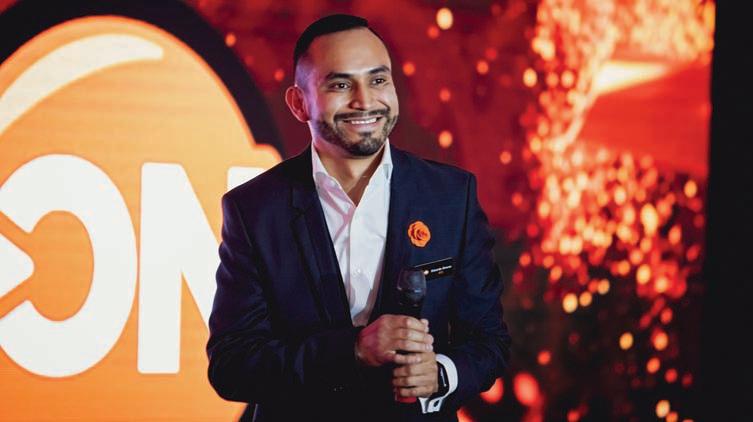
Team Player
Eduardo Alvarez
Director of Sales, Latin America, AGS
Like many other current and past Emerging Leaders of Gaming 40 Under 40 honorees, Eduardo Alvarez did not have his sights set on a career in gaming at the start of his professional career. With degrees in finance and economics, Alvarez, the director of sales, Latin America for AGS, is an economist by academic standards.
When Alvarez embarked on his professional journey, he expected his career to follow his academic trajectory, progressing him through the banking or finance industries. However, just like many in the gaming industry, once Alvarez was introduced to a career in gaming, he was hooked.
His introduction to the industry came in the form of an interview for a data analyst position at Codere Mexico. “I was attracted by so many things during that interview,” explains Alvarez. “Codere’s atmosphere was like magic. The energy of the office, the fact that gaming was an emerging industry in Mexico (at the time), all those things made me want to join the gaming industry.”
Alvarez has continued to surprise himself throughout his career in gaming. From transitioning from an analytics role to marketing and eventually sales, to moving from an industry operator at Codere to an industry supplier at Cadillac Jack and eventually AGS through acquisition, Alvarez’s career trajectory has been anything but linear.
Alvarez recalls his first meeting with a casino manager as a business development representative at Cadillac Jack as one of his biggest challenges. “I remember thinking, can I handle this?” recounts Alvarez. “I pushed myself to do it, knowing I had a strong company and team supporting me, which made it easier.”
Ultimately, Alvarez proved to himself that he could thrive in a selling role on the supplier side of the industry, climbing the ranks to his role today.
Alvarez’s humble, team-oriented and honest attitude has very likely propelled him forward throughout his career. He is quick to credit his team and the company he works for. When asked whether he’s had any influential mentors within the industry, Alvarez can think of many but mentions two in particular.
The first is Leonardo Desentis, whom Alvarez worked with at Codere. Alvarez credits Desentis, director of marketing for Mexico, Panama and Colombia, for opening his eyes to more aspects of the business of business—persuading him to move out of data analytics and onto the marketing team.
On top of this, Alvarez loved witnessing Desentis’ leadership style. “Desentis always gave exposure and credit to his whole team,” explains Alvarez. “He always prioritized the human aspects of business, and I like to do the same thing.”
The second mentor Alvarez highlights is Drew Pawlak, AGS’ vice president and general manager, Latin America.
“Drew has a very quick mind, a huge personality, and has supported me from the start of our relationship,” says Alvarez. “He has become a good friend and I have learned so much from him.”
Young professionals looking to advance their careers in the gaming industry would be wise to learn from Alvarez’s example. When asked to impart advice for the industry’s next emerging leaders, two of Alvarez’s points seamlessly exemplify his career to date.
“This industry is dynamic, and you need to be learning and open to change at all times,” says Alvarez. “Find a good team to be a part of and make sure to always be a good team member yourself.” —Michael Vanaskie is vice president of international development for The Innovation Group.

Chasing Excellence
Hui Min Tiffany Bernadette Tay
Associate Director, Strategic Planning, Marina Bay Sands Pte. Ltd.
Tiffany Tay has gravitated from medical tourism to real estate to entertainment tourism to a popular casino resort during her career. These positions share a common ground, she says: all related to business, all offered a learning experience.
As she moved from industry to industry, location to location, Tay—a Singapore native—kept an eye on the prize, her focus on education and expanding her knowledge. But she admits the trajectory has been more than that.
“For me, it has been a combination of timing, luck and opportunity,” says Tay, the oldest of four children. “Overall, what excites me is the opportunity to sell a product, deliver excellent service or create unforgettable experiences and the right value for the customer.”
Tay graduated from Singapore Management University with a bachelor of business management and accountancy. She worked for the Singapore Tourism Board, dealing with medical travel. Tay made the transition to private equity real estate with Columbia Investment, a company with assets of $500 million. She led a team of 30 in both Singapore and New York. After five years with Columbia, Tay returned to the Singapore Tourism Board in 2018.
Then came Marina Bay Sands, where Tay assumed various roles. The casino resort introduced her to the term CHASE.
“In its most original form, it stands for Committed, Hardworking, Ambitious, Smart and Execute, which resonated with how I have approached life in general.”
CHASE can take on various meanings and combinations under various circumstances, she says. Take obstacles. Tay relies on curiosity and clarity to understand the obstacle, humility and honesty when approaching the obstacle, and sensitivity and empathy when solving the obstacle.
While Covid-19 left a toll, Tay felt fortunate on two fronts. “I worked with a small group in supporting the two joint chiefs in government engagement efforts towards reopening Marina Bay Sands in a smart and safe manner.”
This included demonstrating how various business units reassessed their operations, implemented capacity limits and new safe management measures, and on a property-wide level, developed a holistic health and sanitization plan.
“I was given another occasion to transition into an area that has been challenged by the Covid-19 situation: the international marketing segment.”
Amid crisis there are always prospects, Tay says. “I am grateful to be able to learn and contribute in ways that will value-add and ready the team in heading for recovery in the short run and growth in the long run,” says Tay, who loves to binge-watch Netflix when she isn’t with friends and family.
Through all this, Tay credits a number of mentors at Marina Bay Sands for her success. These include Andrew MacDonald, corporate senior vice president and chief casino officer; Jeremy Bach, senior vice president, chief marketing officer and global marketing; Anne Chen, senior vice president, premium mass market development; Qian Peilai, senior vice president, marketing and global events; Suzie Tan, senior vice president, finance; and William Ang, vice president, human resources, partnering and engagement.
Tay has advice for those who might follow in her footsteps. “Have CHASE, be CHASE. Above all, remain grounded in your values and principles, stay relevant, be agile and adapt to the everchanging environment.” —Bill Sokolic “Holding leadership positions in competitive sports taught me how to manage complex human relationships, take care of my mind and body, think critically in high-pressure situations, and find ways to win.”
A Born Natural
Paul Juliano
Vice President of Operations, Bally’s Corporation
Paul Juliano’s career may have begun with Four Seasons Hotels and Resorts at five-star, fivediamond rated resorts in Jackson Hole, Palm Beach and Bora Bora, but his exposure to the hospitality industry traces way back, literally back to his birth in Atlantic City into a gaming and hospitality family.
Both of his parents work in the gaming and hospitality industry to this day. “I learned at a young age that I enjoyed the special, shared experiences that occur in hotels and casinos. By watching my mother, father, aunts, uncles, brothers and sister in the hospitality industry, I also learned that curating memorable experiences for guests you have not met takes focus, determination, and sacrifice.”
Juliano acknowledges that the hospitality industry is not for everyone. It is grueling and competitive, 24/7/365. He blames his competitive nature on his background in athletics, where he lettered in three high school sports and earned a football state championship title. In college, he was an All-Colonial Athletic Association outfielder and team captain for the NCAA Division 1 William & Mary Tribe baseball team.
“Holding leadership positions in competitive sports taught me how to manage complex human relationships, take care of my mind and body, think critically in high-pressure situations, and find ways to win,” says Juliano.
Today, Juliano is responsible for the oversight of corporate capital projects, hotel operations, and food and beverage for Bally’s Corporation, formerly Twin River Worldwide Holdings, Inc.
“Our company is in a rapid growth pattern, and every day is exciting,” he says. “I am constantly presented with new challenges that come with tight deadlines. I am applying lessons imparted by my mother and father, my background in athletics, and my professional experience within the hospitality industry. I am truly fortunate to work with exceptional people on our corporate and property teams, and I am inspired by those who continuously offer innovation in the industry.”
Being a part of the gaming industry has strengthened his appreciation for the universal language of hospitality that exists in one of the most diverse workforces in the world.
“I continue to be motivated by the thought of providing a special experience to a friend, guest, or employee in any form—from the best cup of coffee to the most memorable hotel stay, to a first-class casino experience,” he says.
Juliano acknowledges all the great mentors who have inspired his quest for knowledge and continuous improvement. He also delivers a sincere thank-you to all the front-line employees who continue to provide world-class service through the pandemic.
“When my morning alarm goes off, I thank God that I have the opportunity to give 100 percent of myself to the day ahead as a father, husband, student and leader—then it’s easy to get to work.” —Thomas Zitt, Ph.D. is a partner in The Innovation Group.
The Next Level
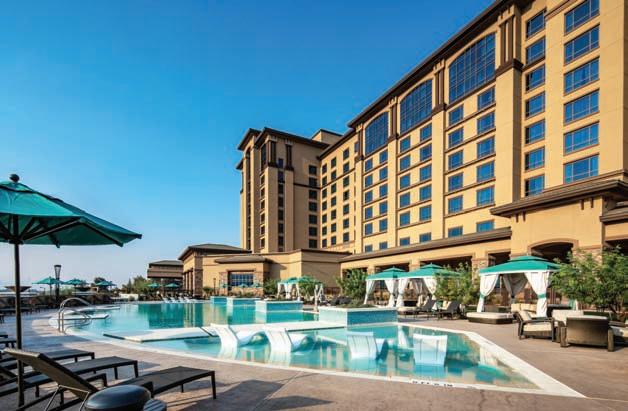
Tribal casinos can no longer get by with gambling alone, so non-gaming amenities help them compete with other commercial and tribal properties
By BiLL SokoLic
Cache Creek Casino Resort, located in the Capay Valley region of Northern California, upped the ante on amenities in its new upscale hotel development. Additions include an outdoor pool along with a 12-seat pool bar, and a 12,000-square-foot spa and salon.
The inclusion speaks to what sells in a casino resort these days. But what sells also speaks in part to the land beyond the hotel tower, in part to the ownership of the resort by the Yoche Dehe Wintun Nation, says Dike Bacon III, planning and business development leader for Memphis-based HBG Design.
“Our design for the expansion draws inspiration from the surrounding landscape that includes elegant vineyards and orchards and capitalizes on extraordinary views,” he says. “The land around the resort is rooted in the tribe’s own farmland and ranches and the Cache Creek River.”
Think about that. You’ll find pool complexes everywhere. Elegant and casual dining, too. Spas to soothe every part of the body. But the connection with the land takes resorts to another level. It’s a level places like Atlantic City have tried to adapt to after years of ignoring the natural beauty of the beach and Boardwalk that houses six of the current casinos.
“The design at both commercial and tribal facilities should be chic, durable, and have timeless appeal,” Bacon says. “Where the differences are found is sometimes how said design is expressed. Those for tribal facilities are often ingrained in culture and can include the celebration of that culture in subtle and abstract ways if the client wishes.”
Some of the most successful and inspired work for tribes has a connection to land in some way, Bacon says. “This sense of place is what can make it unique.”
Cache Creek Casino Resort, pool and spa
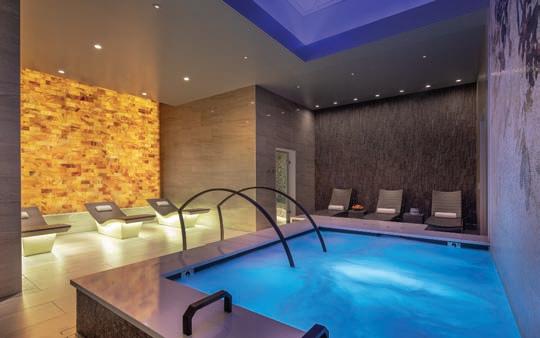
Spa Space
Still, the line between commercial casino resorts and tribal casino resorts has blurred to the point where tribal connections don’t often enter into the frame for the average visitor, at least not on a conscious level. A multipronged spa retreat has the same impact for guests at Four Winds New Buffalo as it does at Borgata Hotel Casino & Spa in Atlantic City or the Venetian in Las Vegas. The fact that Four Winds boasts a tribal ownership does not seem to matter one iota to most guests.
“The approaches between commercial and tribal are similar, since the guests generally look for a resort-type experience, wherever they go,” says Andrew Kreft, executive senior principal and director of design for Lifescapes International.
“One that takes them out of their everyday lives and transports them to a world that caters to their needs, offering experiences that they would not normally get. We always strive to offer the guest a variety of experiences and destinations in the landscape, whether that is a pool area, outdoor dining, or multi-function garden. However, because tribal casinos cater to specific regions, tribes, like any other client, may have particular needs or activities they would like to offer local clientele. We always work closely with them to weave that into the experience.”
Guests of all types, and from various regions of the country, visit Mohegan Sun in Connecticut, and often these visits encompass multi-day stays, so having an impressive pool and terrace offering in the Sky Tower, along with a fitness center, world-class spa, golf and more, is a big differentiator, says Mohegan Sun President and General Manager Jeff Hamilton.
In that regard the Mohegan tribe doesn’t seem to factor into the equation.
Not true, Hamilton says.
The Shops at Mohegan Sun
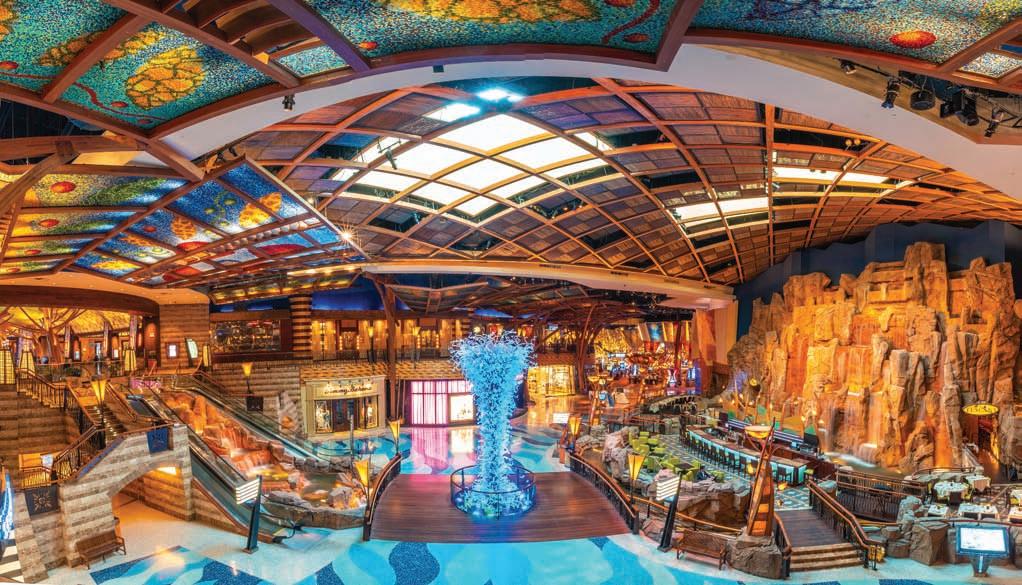
Mohegan Sun and all Mohegan Gaming & Entertainment properties operate under a “positive and inspirational culture that derives from the Mohegan tribe,” Hamilton says. “We are grounded in the Mohegan Way, also known as ‘The Spirit of Aquai,’ which stresses the importance of being welcoming, collaborative, always showing mutual respect and seeking to build relationships. Everything the Mohegan family does have these values at heart.”
Tribal Touches
jewelry, and more. Quill Boutique highlights stylish jewelry, bags and more. “All Four Winds Casino locations are filled with elements that speak to the history, traditions and culture of the Pokagon Band of Potawatomi,” Freedman says. This includes architecture that features copper, cedar wood and stone, which are utilized in many tribal events. “Each of our casino locations also features large fireplaces, which pay tribute to the Potawatomi Indians, who are known as the ‘Keepers of the Fire,’” Freedman says. For the most part, the Seminole Tribe has few links to its history and culture in The Rotunda at Four Winds New Buffalo includes murals from Native the properties it owns in Florida. Since they opened in 2004, it’s been all about American artist Mike Larson that symbolize significant moments of Pokagon the Hard Rock brand in the Hollywood and Tampa properties, spokesman Band history. The wooden decor in the Rotunda at Four Winds South Bend is Gary Bitner says. But the links exist, subtle though they may be. Those sub- reminiscent of black ash baskets traditionally made by Pokagon citizens. tleties, to cite an example, include the sweetgrass scent of bathroom toiletries Throughout the Choctaw Casinos & Resorts properties there is artwork and pool cabanas that take their inspiration from Seminole chickees. that shows the culture as well as the sculptures, such as the Red Warrior in Du-
“Seminole branding is more evident at the other four casinos, and particu- rant and the Seven Ponies in Pocola. The opening of the Sky Tower later in the larly at the Seminole Casino Hotel Immokalee, east of Naples,” Bitner says. summer will include a gallery showcase featuring Choctaw artists.
The Seminoles also maintain a world-class “During the month of November, we celebrate museum (temporarily closed due to Covid-19) Native American Heritage Month and showcase our and its adjacent historical and cultural archives on tribe’s culture in various ways across all the properthe Big Cypress Seminole Reservation, an hour ties,” says Kristina Humenesky, director of public rewest of the Seminole Hard Rock Hotel & Casino lations, Choctaw Nation of Oklahoma. Hollywood. The Ah-Tah-Thi-Ki Museum, accredited by the American Association of Muse- Pool Power ums, predates the development of the Seminole While tribal resorts, like commercial ones, cater to Hard Rock brands. adults who gamble, Bacon says a trend in certain
“The tribe hopes the museum will reopen markets speaks to family fun. sometime this year,” Bitner says. “These are multi-use facilities that can include
Tribal customs and culture often come out in bowling, arcades, movie theaters, and grab-and-go retail settings. food outlets. These centers appeal to a large, diverse
“The variety of shops and specialty Native demographic and often are important contributors to American items available for purchase at our flag- a staycation type of experience,” Bacon says. ship resort, Four Winds New Buffalo, provide a Mohegan Sun’s flagship property in Connecticut unique shopping experience for guests,” says offers shops, bowling and an arcade, go-kart racing, a Frank Freedman, chief operating officer, Four trampoline park and the Mohegan Sun Golf Club. Winds Casinos. The massive resort is in close proximity to the Mystic
Four Winds Outfitters sell tribal artwork. The seaport and other quaint seashore towns. Promenade Shop features men and women designer The District at Choctaw casinos offer over 70 clothing and outerwear, Native American-designed Rotunda at Four Winds New Buffalo of the newest arcade games, 20 lanes of bowling and
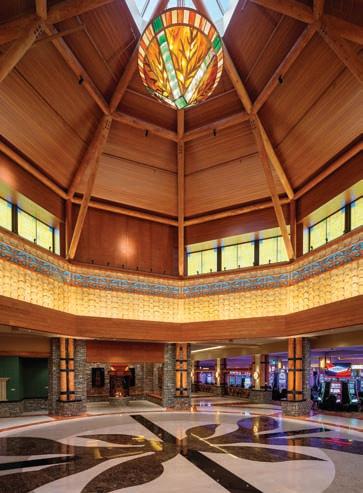
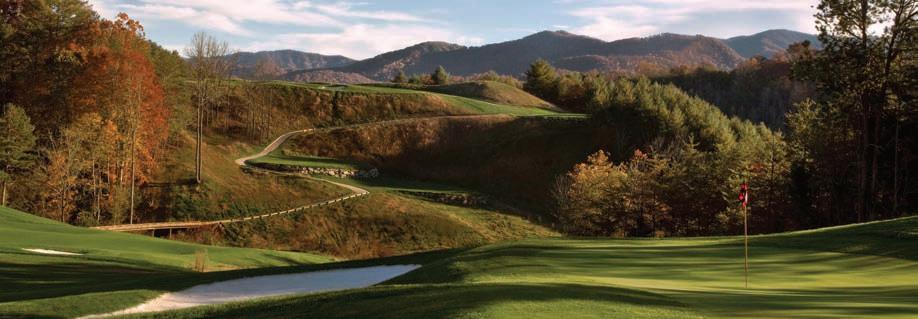
four movie theaters, Humenesky says.
Increasing competition has led various resorts to seek an advantage. The breadth of offerings at spas is one way.
Rock Spa & Salon at the Seminole Hard Rock properties in Florida presents a range of treatments and healing therapies with services from Elemis, Natura Biss, Hydrafacial MD and the like. The spa boasts separate and coed dry and wet lounges, dipping pools, saunas, quiet rooms, a Himalayan salt room and three 800-square-foot couples treatment suites. The spa also features a 3,600square-foot salon and 3,300-square-foot fitness center.
At the spa, in the Choctaw casinos, guests are able to choose from a collection of massages, facials and body treatment services. The space boasts nine treatment rooms, including two extravagant couples’ suites with an ultra whirlpool soaking tub for two and a couple’s rain shower. There is also a coed relaxation lounge and a coed reflection waters/waterfall mineral bath.
A new 23-story hotel under construction at Four Winds South Bend will feature a “spa, convention area, meeting space, a ballroom, lounge, bar and grille, an outdoor rooftop swimming pool, and terraces with spectacular views,” Freedman says.
Pools in resorts are not just places to get your laps in, not by any stretch.
“In each situation, a successful pool area creates a dynamic experience for the guest that offers them a variety of moods, activities and destinations, to promote a longer guest stay,” Kreft says. “Different types of pools and activity levels allow the guest to choose their level of interaction as their interests change from day to night, as well as catering to different age groups.”
VIP areas highlight swim-up bars and private cabanas for adults. But other areas welcome families with the kind of lazy river activities found in the best water parks.
“We want to create pool and outdoor environments that are multi-dimensional and multi-generational spaces,” Bacon says. “If the site area is large enough, these flexible outdoor areas can serve various uses like banquets, receptions, social functions, concert entertainment, and even overflow al fresco dining,”
The Choctaw’s Oasis Tropical Pools include two swim-up bars, hot tubs, fire pits, a waterslide, waterfalls and cabanas. Guests can swim in the Natatorium, year-round.
“Pool and landscape areas are wonderful to view all year, and we think there is great opportunity to design interior spaces that capitalize on views to the pool and blur the lines between outside and in,” Bacon says.
There has also been a distinct trend in casino resort design to create gaming and non-gaming spaces that are animated with natural light and celebrate outdoor views and outdoor spaces, Bacon says.

Natural Beauty
Harrah’s Cherokee Casino Resort and Harrah’s Cherokee Valley River Casino & Hotel in the westernmost part of North Carolina benefit not only from a tribal influence, but a natural one that owes to the surrounding land. The Great Smoky Mountains National Park shapes the northern boundary of the resorts, and the North Carolina entrance to the scenic Blue Ridge Parkway is only a mile away, says Brian Saunooke, regional vice president of marketing for the resorts. Visitors can enjoy year-round activities like hiking, whitewater rafting, canoeing, and trout fishing.
“Part of the resort experience is being able to take advantage of a wide variety of activities which include outdoor and local attractions serving to increase visitation,” Saunooke says.
The Great Smokey Mountains provide a beautiful backdrop and another opportunity for guests to enjoy the wide variety of experiences nearby for those who visit Cherokee, he says.
At the Oconaluftee Indian Village, visitors can see the challenges of Cherokee life at a time of rapid cultural change as European settlers invaded Indian lands. Tour the authentic working village with dwellings, residents and artisans right out of the 1760s.
The Museum of the Cherokee Indian includes a self-guided tour that combines computer-generated imagery, special effects and audio with an extensive artifact collection.
Founded in 1946, Qualla Arts and Crafts is the nation’s oldest Native American cooperative, and it continues to uphold a standard of excellence when it comes to the traditional arts and crafts of the Eastern Cherokee.
One of the longest-running outdoor dramas in the U.S., Unto These Hills,has entertained more than 6 million people since 1950. Recently rewritten to better reflect the Cherokee’s true history and culture, the play is a must-see when visiting.
“Our location and the fact that we are owned by the Eastern Band of Cherokee Indians give our guests an opportunity to experience not only our offerings at the resorts, but a variety of outdoor and cultural experiences,” Saunooke says.
In the end, a casino hotel resort is a destination experience. It encourages a longer stay by offering numerous dining, retail, entertainment, and play options outside of just traditional gaming, so the guest always has something new to do.
“A connection with the outdoors and a pool experience is crucial to this, and even more so moving forward as we consider social distancing flexibility in all designs,” Kreft says. “In markets where there are competing tribal casinos nearby, the more you can offer, the greater likelihood of attracting guests to your property, thereby ensuring your casino’s success.”
Success by Location
The online gaming boom could not have happened without the essential element of geolocation technology
By Dave Bontempo
Geolocation companies pop the champagne.
As the three-year anniversary of the repeal of the Professional and Amateur Sports Protection Act (PASPA) dawns, they savor an unprecedented era. Geolocation outfits are the gateway to the Golden Goose of many gaming enterprises.
Their penchant to monitor, detect and thwart fraud are irreplaceable, especially considering online gaming’s looming multibillion-dollar stature. While fraud protection is a permanent function of geolocation companies, that realm will grow. Spinoff areas like data collection and responsible gaming contain both marketing components and a societal benefit.
In some ways, the geolocation celebration is in full swing. In others, it just began.

The Backdrop
Consider this evolution in the past couple of years. New Jersey may soon exceed $1 billion in online wagering handle in a single month at least a couple of times per year. The Garden State has already been well above $900 million, and March Madness handle was expected to propel New Jersey above the milestone this year.
Pennsylvania and Michigan have cleared half a billion dollars in recent months. Several others states may soon routinely exceed $250 million each month.
The May14, 2018 death of PASPA, an unofficial gaming holiday, indeed created a new, unforeseen life for the industry. That’s been enhanced, dramatically, by the magnitude of mobile that few foresaw.
It took geolocation compliance measures from 0-100 mph almost overnight.
Servicing the resulting need is a major profit source for geolocation companies. Two shared their thoughts with us.
Taking Big Strides
GeoComply, based in Vancouver with an office in Las Vegas, obtained the pole position in the security and compliance realm of iGaming several years ago. But the industry bellwether hasn’t paused to admire its perch.
Last month, the company made two significant announcements.
One concerned an agreement for minority investments led by funds managed by Blackstone Growth. The partnership represents the first commitment of institutional capital to the company.
Two, GeoComply strengthened its management team by promoting Lindsay Slader to managing director of gaming, where she will be responsible for the success of GeoComply’s gaming business in the U.S. and worldwide. GeoComply also added GLI veteran Chad Kornett as vice president, global government relations.
The changes support the exponential growth of GeoComply’s core business along with its expansion into international markets.
GeoComply, which states that it blocks 100,000 unique fraudulent users per month, balances two significant priorities. One helps states determine where customers are and if they are gambling legally. The second, its responsible gaming platform, helps bettors avoid addiction.
Slader, highlighted among GGB’sEmerging Leaders of Gaming in 2019, has been at the forefront of the company’s efforts. In her former capacity, Slader played a prominent role educating elected state officials about safety, security and transparency to match online gaming’s frenetic pace.
In one of her testimonies before New York state officials, Slader demonstrated real-time blockages GeoComply issued to stop New Yorkers from gambling illegally. The eye-opening reality underscored the volume of revenue New York was losing by not legalizing online gaming, as well as the need for strict compliance monitoring.
Slader believes one of the most remarkable aspects of the past year was seeing the company’s solutions tailored to a wide range of complex geolocation compliance challenges.
“We saw Washington, D.C. not only carve out their district for both sports betting and iLottery, but then have a patchwork of exclusion zones applied across their jurisdiction,” Slader indicates. “Stadium venues and federal lands are prohibited from wagering; furthermore, individual bars/taverns/retailers will look to offer their own form of betting solely within their building footprint in the coming months.”
Vivid incidents continue underscoring the public’s gambling appetite. New York residents take trains to New Jersey, wager and return home. The process often requires a couple of hours.
Patrons can’t participate in the rising in-game market for live bets this way, but it beats no gambling at all. “Users traversing borders definitely keeps us on our toes and inventing new ways to build out our systems,” Slader says. “The technical demands of being able to place a mobile bet
—Lindsay Slader, Managing Director of Gaming, GeoComply

from your phone, wherever you may want to wager from, requires us to constantly augment our technology to keep pace.”
Perhaps every American state will ultimately legalize online gaming. That won’t be the end of the geolocation role, however. It might simply constitute Phase One.
“If everyone can eventually bet on sports in every state, there will still be the individual needs of each state to uphold, primarily, their state-contained regulatory regime,” Slader indicates. “Whether there is betting in both New Jersey and New York, each state will license its own operators, who in turn pay their own licensing fees and taxes. The technical requirements of each state may also vary to require customized user experiences based on location.
“One thing is for certain—location is becoming one of the primary drivers to how products and content are delivered to digital users, and this will only become more pronounced over time. GeoComply seeks to empower the future of digital trust with its data capabilities beyond the gaming industry as our company grows and expands into fintech and beyond.”
Slader also touts the company’s role in rooting out fraud in the iGaming and sports-betting industry,
“We are often called upon by law enforcement to help analyze data tied to financial crimes investigations,” Slader indicates. “Payment fraud and identity theft are two areas where our technology is commonly used to crunch device and location data for investigative purposes.
“Our standard system has a wide range of unique controls to detect and block—not just location spoofing fraud, but other activities such as proxy betting, account sharing, and bonus abuse that operators look to us to help spot in real time. We see state regulators demanding more and more of these tools and controls by default to ensure robustness and integrity across their market.”
A company geared to fraud deterrence has a lifetime role in gaming. And the duties will expand.
“Hybrid geolocation systems deliver against the complex (and literal) map of sports betting opportunities—ring-fencing sports stadiums in the heart of Washington, D.C., or weaving a patchwork of virtual controls across a state like Michigan where tribal reservations and a varied taxation model call for hyper-accurate knowledge of your patron’s whereabouts,” she says. “We sometimes use a blend of proprietary hardware and software to make this happen at venues such as casino properties or inside sports bars.”
Another relevant service is the improved used of data. As that continues to drive how users interact with a product, the company has expanded its business into ID verification with IDComply, its KYC product.
“It uses things like facial recognition to make it easier to verify your identity when creating an account, and builds in multiple failovers for the best ID verification rates,” Slader says. “We feel that creating a single system to pile on all possible layers when verifying a driver’s license or billing address is a must-have to make it a frictionless non-event on the player’s side.”
Not all efforts address illegal gambling. Some can help people avoid getting in over their heads.
The responsible gaming focus, for example, is substantial. The extremes of winning, losing and perhaps losing too much occur at lightning speed online for patrons. There is no natural pause to find a restaurant or stroll the premises.
The adrenaline rush is a target of all responsible gaming initiatives. “We have spun up a nonprofit entity called Conscious Gaming to offer tools to regulators and operators, which are designed to help self-excluding users do so more effectively across state borders,” Slader asserts. “We are well acquainted with how bettors travel across state lines to wager, and this is no exception for individuals dealing with gaming-related problems such as addiction. Our tech to facilitate this is called PlayPause.
“So far, we have been very fortunate to see regulators welcome PlayPause not only for self-exclusion capabilities, but also for its ability to manage impermissible bettor lists, such as sports league rosters, prohibited players, and other persons who may need to be excluded by operators from their betting pool. I think the leagues’ support for these important initiatives will help us offer this technology to anyone who may need it to protect the integrity of the betting product and its most vulnerable audiences.”

Advancing Industry by Industry
LocationSmart provides cloud-based location services to businesses with mission-critical needs to understand where their resources or users are located, according to Mario Proietti, company founder and CEO.
The Carlsbad, California-based company gradually evolved into this space. Proietti says that when the company began 25 years ago, it focused









